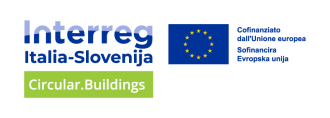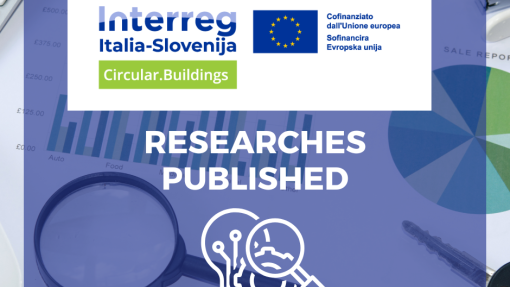The comprehensive set of analyses investigating innovations, best practices and legislation in the sector is now available to all stakeholders in the construction industry.
After a year of intense work, it's now available the research carried out on ‘Circular Construction’ by the Circular Buildings project partners: the Department of Artificial Intelligence and the Department of Energy Efficiency at the Jožef Stefan Institute, the Department of Engineering at the University of Udine, the PRIMORSKI TEHNOLOŠKI PARK in Nova Gorica, and the business support organisations Ecipa, OZS and URES SDGZ.
On the one hand, the analysis work has made it possible to examine in detail the level of maturity of local actors in terms of innovation and environmental sustainability, as well as their priority development needs. On the other hand, it has allowed for a comprehensive investigation of best practices and the most interesting innovations at the international level, identifying those that can best support the sustainable growth of local construction. Regulatory aspects were not overlooked either (with a focus on legislation relating to construction waste), in order to assess potential bureaucratic and legislative obstacles to the adoption of good circular economy practices in the sector.
In detail, the project produced four research papers over the course of an intense year of work:
Research on best practices in the circular economy in the sector, which, starting from an analysis of the most relevant best practices at international level (e.g. with regard to ), identified those most relevant to the characteristics of cross-border construction between Italy and Slovenia – Research coordinated by the Department of Engineering of the University of Udine
Research on some of the most relevant innovations in the sector, useful for promoting energy efficiency and circularity in buildings, which, thanks to the involvement of the Department of Artificial Intelligence of the Jožef Stefan Institute in Ljubljana, a project partner, allowed a particular focus on AI-based solutions and tools - Research coordinated by the Department of Energy Efficiency and the Department of Artificial Intelligence at the Jožef Stefan Institute
Research on legislation relating to waste management in construction, which made it possible to assess the possible presence of bureaucratic and regulatory obstacles to the circular and efficient management of materials in the construction sector. Starting with an overview of European, Italian and Slovenian legislation in the sector, the research compared legislative and bureaucratic aspects between Veneto/FVG on the one hand and Slovenia on the other, to enable the subsequent transfer of good practices between the two sides of the border. - Research conducted by partners ECIPA (project leader), OZS - OBRTNO PODJETNIŠKA ZBORNICA SLOVENIJE and URES SDGZ.
Finally, a field analysis investigated the level of knowledge and implementation of circular economy innovations and good practices among companies and professionals in Veneto, Friuli Venezia Giulia and Slovenia. The quantitative survey (with questionnaires administered to hundreds of operators in the sector) and qualitative survey (with more than 30 interviews with professionals and businesses) made it possible to thoroughly investigate the real obstacles preventing widespread adoption of the innovations and good practices identified. The field analysis also provided valuable insights into the needs of businesses and professionals, which the project will address in its second year of activity. The research was conducted with the contribution of all project partners.
More details on the content and results of each individual research project are available in the dedicated articles available from today on the project website.
To receive the analysis documents directly by email and for any further information on the research projects and the support activities for companies and professionals planned for next year, please send an email to the Circular Buildings staff - circular.buildings@ecipa.eu

